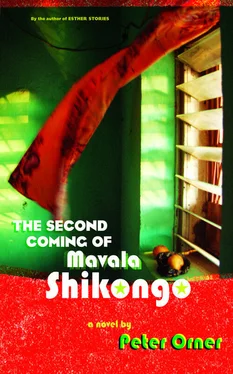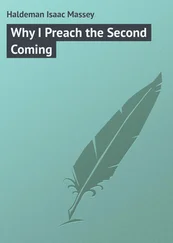OBADIAH: Would you like a mint?
KAPLANSK: Please.
For her, it’s nearly a love story. She tells it as she beats a carpet she’s hung off the mapone in her garden. She beats the carpet with a wooden spoon the size of a small child’s head. At her feet the wash towels are boiling. Her apron is tight around her chest like body armor.
Thump. Dust waffles up.
There was once a man who stuck his wife’s hand with a fork to prove he loved her, and she walked around with this scar, proudly showing it to people. Then one morning she hacked off his legs with a panga and he bled to death in bed.
Thump. Dust waffles up.
But even after that, she showed her hand with pride. Four little valleys pronged in the flesh. Thy will be done. On earth as it is in heaven.
Thump. Thump. Dust waffles up.
He runs barefoot in the limp sand of the riverbed. He loves the feel of it between his toes. That sound, that shish shish, of sand being thrown behind him. There are days it is the sound alone that keeps his feet moving. That beautiful grinding. One day he’ll run as fast as Rubrecht Kanhala. To run with a pucker thorn in your foot is better, because then you feel no fatigue in the muscles, only the wound in your foot. The pain builds more than endurance. It creates forgetting — and if you can forget, that’s all that matters. He’s read this in a runners’ magazine. A Kenyan said it and it’s the truth.
And the goats snoofing each other’s asses and us sprawled, dunking buttermilk rusks in cold tea, and Pohamba’s got another brother.
“God have mercy,” Festus howls. “Spread-leg woman gave birth to an army.”
Pohamba’s on his stomach. A Standard Two he’s hired to do some chiropractic work walks up and down on his back as he talks.
“Abner, my fourth brother. He worked at the Budget on Peter Mueller Strasse. My other Windhoek brother. He cleaned the cars when the tourists brought them back from a week of chasing elephants at Etosha. Dirty dirty cars, and my brother Abner washed them like babies’ arses. The thick dust of Etosha made him sneeze and sneeze, but he washed and wiped and scrubbed and hosed. But this isn’t what I want to tell you. What I want to tell you is, the baas wouldn’t let him use the toilet to shit. The man was enlightened. He said my brother could piss in the toilet, but not shit in it. For that he had to go across the street to the takeaway.”
“How would the baas know he was shitting?”
“Easy, if it was too quiet, he’d start pounding on the door.”
(Obadiah, offstage left, from behind the mapone, where he’s been dozing: “What the baas of course didn’t know is that one’s posterior is eighty percent cleaner on average than one’s hands. Thus —”)
“Thus what?” Pohamba says. He stands up. The Standard Two drops off his body like a free-falling Lilliputian. “Thus what?”
We wait. His brother could piss, but not shit. Thus what?
Obadiah comes out from behind the tree and, as if this were some proper debate in some proper debating place, concedes defeat, bows to Pohamba, his left arm swooping through the dust.
79. A VISIT FROM COMRADE GENERAL KANGULOHI
Antoinette enthroned on a plastic chair amid her wilted tomato plants and rock-hard radishes. The rest of us are frantic. On her sun-ravished face is the serenity of absolute truth. Not only wasn’t she going to kiss the ring of any general, she wasn’t going to grace him with a single wash of her eyes. Two of her nephews went north to fight the Boers. One came back in a plastic bag; the other didn’t come back at all.
But that wasn’t it. She said she didn’t blame any general for what had happened to those boys. They were heading for it, even before they got the ridiculous idea they were men. This is the way of boys. They go off to war and come back dead, or not at all. She wasn’t blaming the general for those boys, she was blaming the general for being a general.
Antoinette said we were so ignorant we didn’t know the difference between Jesus and the devil’s houseboy. “And make no mistake, your general is in Lucifer’s pay,” she said. Antoinette, radical pacifist, pontificating lazily, shockingly. As I swung around her house with a loaded wheelbarrow, I paused to ask, “So how do soldiers come home from war if they happen to still be alive?”
“Where are you taking that garbage?”
“Behind the toilet houses.”
“Go farther.”
“All right.”
“What did you ask?”
“You think fighting the South Africans was righteous?”
She shook her head.
“If not righteous, then justifiable?”
“Acceptable under the circumstances.”
“So then how does a soldier return?” I stood there with my garbage. Antoinette, calm in her plastic chair, began to soar, her eyes fanatical. “ON HIS KNEES!”
The door of their house flapped open and Obadiah stepped out in an aviator hat with earmuff flaps. “Bravo, wife! Oratory! But it’s only pomp, and pomp never hurt a soul. Now, come, puss-puss, go slip on your green dress. It goes so well with the venom in your eyes.”
No one had ever heard him call her puss-puss before. Maybe she hadn’t either. She didn’t blink. “In holy hell, my green dress.”
Thus, Antoinette refused to lift a finger during the most comprehensive clean-up operation in the history of the farm. We buried random scrap metal. We skoffled the weeds. We picked up goat shit pellet by pellet. The principal had even ordered some boys to rake the veld, the entire veld, which is a bit like trying to siphon off the Atlantic, and they were doing it. The sand rippled out in crests in every direction. It was difficult to know where to walk, the scalloped veld looked so good. I thought of sand traps at the country club I used to caddy at before I got fired for being more interested in the cabana girls.
General Zacharias Kangulohi (combat alias Ho Chi Minh) was our famous alumnus. He rose from farm-boy dust to a great man in SWAPO. He’d lived in exile in London, Dar es Salaam, New York, Lusaka, Stockholm. We stood by the newly painted mural of Hendrik Witbooi with Namibian flags for his eyes and a scroll of the constitution in his hand. We waited. Each boy wore something around his neck that resembled a tie. Ribbons, scarves, cowhide, socks, braided plastic bags. One boy used a piece of biltong, which he nibbled on as morning wasted into noon. We waited. Mavala stood at attention in full camouflage, her green shirt buttoned to her neck, her pants tucked into her boots and blooming out. Her right fist clenched. Her short short hair and bullet head. Her ears stuck out from under the edge of her cap. God, I wanted to bite them. Whatever bitterness she had over the way she was decommissioned (one last paycheck and so long, comrade) was at least temporarily displaced by her sense of ceremony. She was back in the sweat of it — if not of war, something.
Our guest of honor was hours late, and the principal held us there at gunpoint with his bullhorn. He couldn’t get enough of the sound of his amplified voice. The flesh-gnawing horseflies couldn’t get enough of us. They descended en masse. Move in for the chew, boys! We didn’t want cold water anymore, or shade. We prayed only that the sun kill us faster. I’ve heard the same is true of freezing. After a certain point, it’s blissful. We stood; we waited. When the general’s motorcade did arrive, it was like an alien landing — a battalion of motorcycles, land cruisers, jeeps, a limousine, even a mobile home. We stood there as the parade rushed across the soccer field and formed a horseshoe in front of us. When the kicked-up dust settled on our slickened faces, we stood up straighter. The lines of the new anthem quivered on our lips, ready to burst:
Читать дальше












